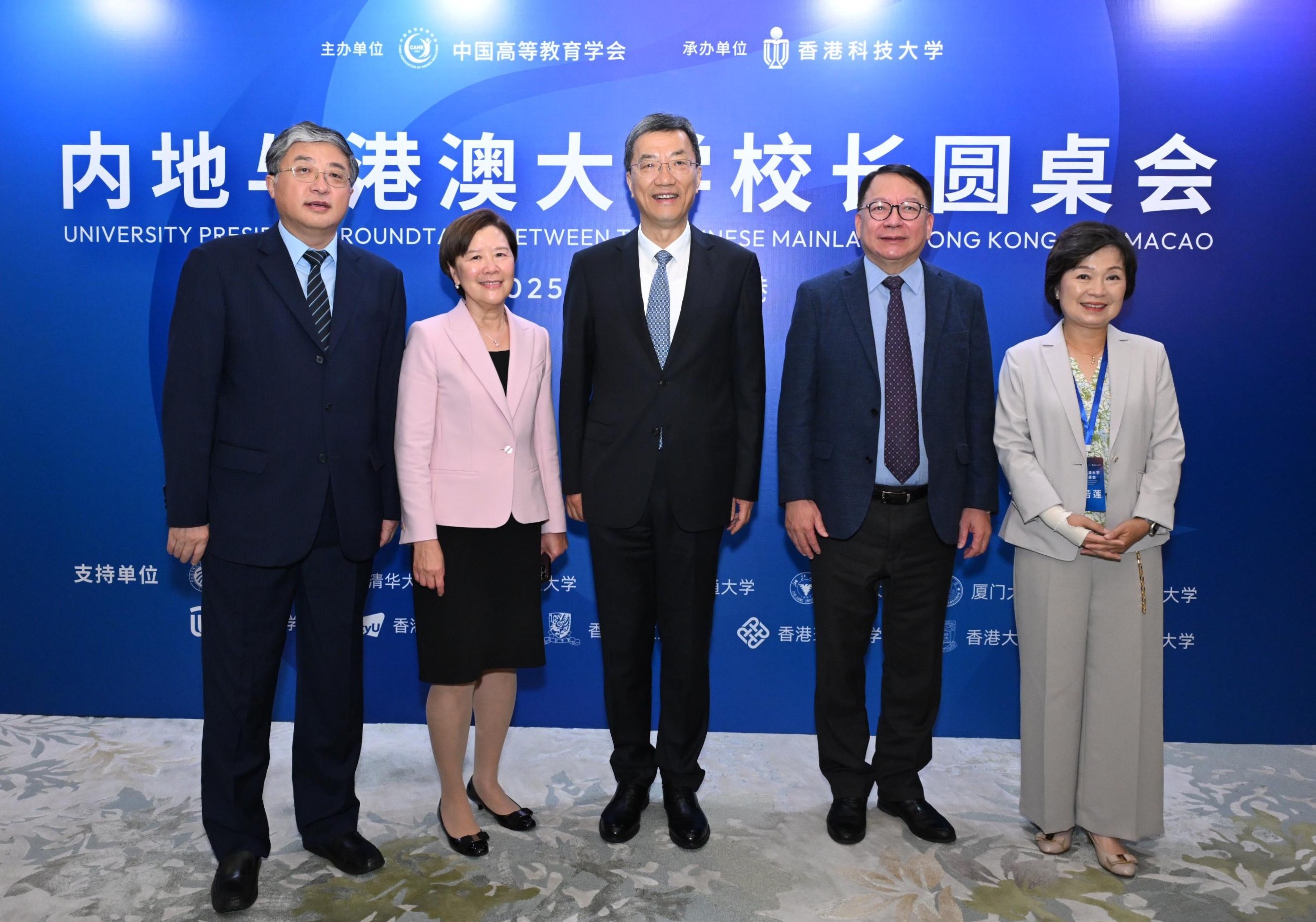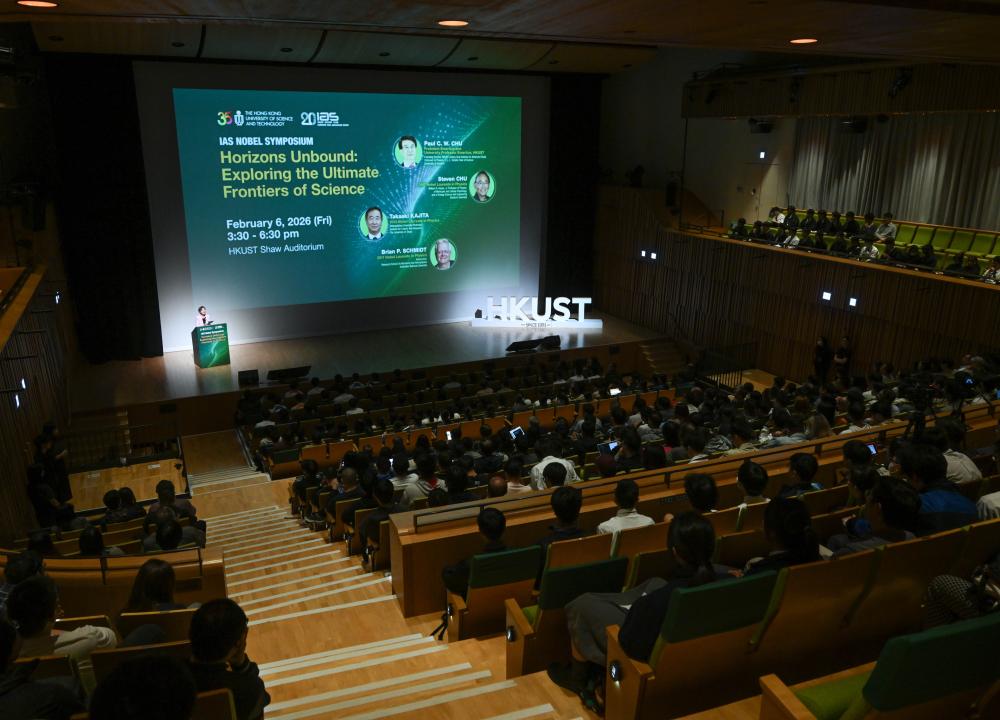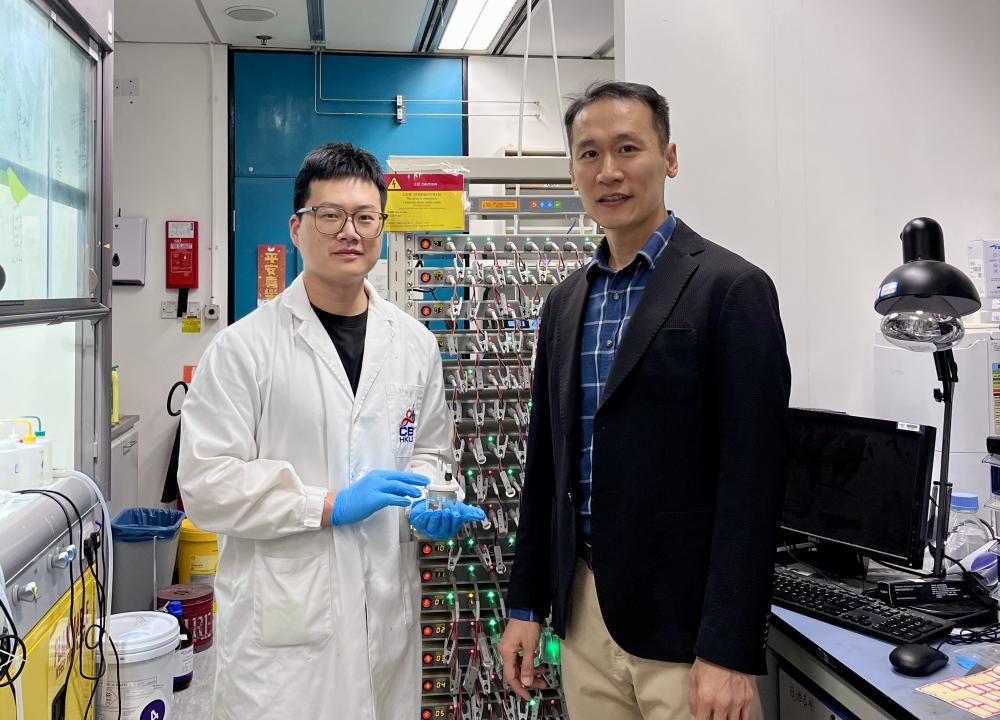CAHE and HKUST Co-hosts "Mainland-Hong Kong-Macao High-Level University Presidents Roundtable" in Hong Kong
Focusing on Building an Education Nation and Collaborative Innovation
The "Mainland-Hong Kong-Macao High-Level University Presidents Roundtable" hosted by the China Association of Higher Education (CAHE) and co-organized by The Hong Kong University of Science and Technology (HKUST), was successfully held in Hong Kong yesterday. Themed "University Missions and Collaborative Innovation in the Context of Building an Education Nation," the event featured a keynote speech by HUAI Jinpeng, Minister of Education of China, with opening remarks by CHAN Kwok-Ki, Chief Secretary for Administration of the Hong Kong Special Administrative Region (HKSAR) Government, and LIN Huiqing, President of the China Association of Higher Education.
The roundtable also witnessed the inauguration of the "Open Alliance of Life Science," officially launched under the joint witness of Minister Huai Jinpeng, LUO Yonggang, Deputy Director of the Liaison Office of the Central People's Government in the HKSAR (LOCPG), CAHE President Lin Huiqing, and Dr. CHOI Yuk-Lin, Secretary for Education of the HKSAR Government.
The meeting brought together leaders from 15 top-tier universities and research institutions, including Peking University, Tsinghua University, Fudan University, Shanghai Jiao Tong University, Zhejiang University, Xiamen University, Sun Yat-sen University, Westlake University, Shenzhen Medical Academy of Research and Translation, The University of Hong Kong (HKU), The Chinese University of Hong Kong (CUHK), The Hong Kong University of Science and Technology (HKUST), The Hong Kong Polytechnic University (PolyU), City University of Hong Kong (CityU), and the University of Macau. Over 70 representatives from the higher education sector, as well as government officials from the Hong Kong and Macao Work Office of the CPC Central Committee, LOCPG, the Ministry of Education, and the HKSAR Education Bureau participated in discussions on higher education development strategies.
Promoting Research Collaboration and Leveraging the Greater Bay Area's Strengths
In his keynote address, Minister Huai pointed out that "Education constitutes the most profound, enduring, and gigantic force for achieving national strength and prosperity. It is a key element for sustained economic prosperity and the core 'secret code' for enhancing a nation's comprehensive competitive strength. We must gain a more accurate understanding and grasp of President and General Secretary XI Jinping's important remarks on education. Within the new coordinates of education and Chinese-style modernization, as well as Chinese education and the world, we must clearly discern the profound transformation in the internal and external environment of education, and thereby grasp the contemporary position, historical responsibilities, and major tasks of education."
Minister Huai emphasized that the new round of technological revolution and industrial transformation is accelerating, and the world has entered an era of innovation-driven development. In the meantime, the acceleration of interdisciplinary integration has created new historical opportunities for the development of higher education. It is necessary to establish a new concept of education, organically integrating the missions of talent cultivation, educational development, and scientific and technological innovation, moving from the narrow logic of educational development to the broader logic of serving the construction of a modernized strong nation and promoting the development of global higher education.
“We must fully leverage the synergistic advantages of the Guangdong-Hong Kong-Macao Greater Bay Area in terms of industry, science and education, finance, and international cooperation to accelerate the construction of regional technology transfer centers for universities across the country. We should gather the efforts from government, industry, academia, research, and finance to establish new mechanisms for the integrated development of scientific, technological and industrial innovation. We should actively support the Alliance for Open Life Sciences in launching the world-class scientific journals as initiating and participating in Mega Science programs. To meet the demands of the digital age, we must actively support universities in Hong Kong and Macao in strengthening their forward-looking layout in artificial intelligence and promoting the transformation of education empowered by artificial intelligence,” he added.
Minister Huai also stated that the construction of an education powerhouse is a systematic project. He hopes that universities in the mainland and Hong Kong and Macao will align with the goals and tasks of building a strong nation through education, work in tandem, and move forward together. It is essential to further leverage the unique role of Hong Kong and Macao to promote Hong Kong as an international education center as well as global innovation and talent hub. We must continue to strengthen cooperation and exchanges with world-class universities and successfully host the "World's Top Universities Forum."
Mr. Chan Kwok-Ki, Chief Secretary for Administration of the HKSAR Government, said, "Hong Kong’s higher education sector has consistently leveraged its strengths to advance national educational development goals. Under the unique advantages under the principle of 'One Country, Two Systems', Hong Kong ranks among the world’s top five in overall education competitiveness and boasts five universities within the global top 100. In the coming decade, as China enters a golden era of rapid educational advancement, the HKSAR Government will steadfastly fulfill Hong Kong’s role as an international bridge and gateway. We will fully promote the internationalization and diversification of higher education, deepen collaboration between Hong Kong and mainland institutions, and foster future-leading talents and scientific elites—all contributing to building China into an education powerhouse and advancing national rejuvenation."
Lin Huiqing, President of the CAHE said, “The national blueprint for building China into an education powerhouse and its three-year action agenda are being comprehensively advanced and accelerated. Universities in the mainland, Hong Kong, and Macao constitute vital components of our self-reliant and high-calibre higher education system, serving as cornerstone forces in this national endeavour. Platforms such as the Guangdong-Hong Kong-Macao University Alliance have facilitated cross-regional faculty exchange, student mobility, and research resource sharing. Through concerted efforts between higher education institutions in Hong Kong/Macao and mainland research organizations, a series of internationally impactful achievements have been produced.”
She stated, “Accelerating the development of an education powerhouse represents both an honourable mission and historic responsibility jointly shouldered by universities across the mainland, Hong Kong, and Macao. CAHE remains steadfast in aligning with national development priorities. We focus on advancing education powerhouse construction by leveraging our unique strengths as an academic society to deepen scholarly research, think tank development, international cooperation, educational governance, and public service. Looking ahead, CAHE will continue uniting member institutions and collaborating with universities throughout the mainland, Hong Kong, and Macao to make new and greater contributions toward enhancing higher education cooperation and serving the national education powerhouse initiative.”
President Prof. Nancy IP of HKUST stated at the meeting, "HKUST is proud to serve as the host institution for this roundtable meeting and is excited to collaborate with top-tier universities and institutions from the Chinese mainland, Hong Kong, and Macao in establishing the Open Alliance of Life Sciences. As China advances its vision of becoming an education powerhouse, its universities must embrace a more prominent global role. Hong Kong’s academic institutions, with their internationally competitive research environment and innovative capacity, are uniquely positioned to drive this mission forward. HKUST sees this meeting as an opportunity to promote ongoing resource integration and institutional innovation among universities across the mainland, Hong Kong, and Macao, while strengthening international cooperation in education and research. We remain committed to advancing the national strategy of revitalizing China through science and education, positioning Hong Kong as an international higher education hub, and enhancing regional and global educational collaboration."
University and institutional leaders engaged in in-depth discussions, sharing valuable insights on various topics. Participants included:
Executive Vice President ZHANG Jin of Peking University
President LI Luming of Tsinghua University
President JIN Li of Fudan University
President DING Kuiling of Shanghai Jiao Tong University
President MA Yanming of Zhejiang University
Party Secretary ZHANG Rong of Xiamen University
President GAO Song of Sun Yat-sen University
President SHI Yigong of Westlake University
President YAN Nieng of Shenzhen Medical Academy of Research and Translation
President ZHANG Xiang of The University of Hong Kong
President Dennis LO of The Chinese University of Hong Kong
President Nancy IP of The Hong Kong University of Science and Technology
President TENG Jin-Guang of The Hong Kong Polytechnic University
Provost and Executive Vice President LEE Chun-Sing of City University of Hong Kong
Rector SONG Yonghua of University of Macau
Three Core Themes, Five Key Directions: Building a Path to an Education Nation
The roundtable meeting explored how world-class universities can seize opportunities amid complex global dynamics, strengthen exchanges, and deepen open collaboration. Discussions centered on three themes: "Universities' Role in National Development," "The Greater Bay Area’s Contribution to an Education Nation," and "Hong Kong and Macao’s Responsibilities in Educational Advancement." Participants engaged in in-depth dialogues on interdisciplinary innovation, international research collaboration, open paradigms in life sciences, and preparations for a Global Summit of University Presidents.
The meeting emphasized the imperative of implementing national education strategies, establishing high-level academic platforms, and promoting mutual learning among global institutions. Mainland, Hong Kong, and Macao universities must synergize strategically, utilizing the Greater Bay Area platform and Hong Kong’s bridging role to advance internationalization. Key action areas include:
Upholding moral education to cultivate next-generation talent for national rejuvenation.
Enhancing resource integration to expand talent development pathways.
Strengthening research collaboration to build innovation hubs.
Driving digital transformation in education.
Serving as a nexus for international cooperation.
To bolster partnerships, Tsinghua University, Fudan University, Shanghai Jiao Tong University, Zhejiang University, Xiamen University, and Sun Yat-sen University signed agreements with HKUST, CUHK, PolyU, CityU, HKU, and the University of Macau respectively, covering research, talent development, and academic exchanges.
A key highlight was the signing of a carbon neutrality cooperation agreement between HKUST and Tsinghua University. The partnership will combine both institutions' research strengths in environmental science, renewable energy, advanced materials, and artificial intelligence to develop low-carbon technologies and accelerate green transformation.
Through this collaboration, the universities aim to advance multilateral cooperation on carbon neutrality and smart energy systems, helping achieve global carbon neutrality goals.
Launch of the Open Alliance of Life Science
The meeting announced the establishment of the Open Alliance of Life Science by 15 institutions, accompanied by the release of the Global Openness and Collaboration in Life Sciences initiative and the launch of the Vita series of high-impact scientific journals. The Alliance will be chaired by Prof. Jin Li, President of Fudan University, with co-chairs Prof. Shi Yigong, President of Westlake University, and Prof. Nancy Ip, President of HKUST. A secretariat will be based at Fudan University, while HKUST will host a Hong Kong office to leverage the city’s "super-connector" role.
The Alliance will pool resources from mainland China, Hong Kong, and Macao to drive talent development, research innovation, and translational outcomes in life sciences, in partnership with global institutions. It calls on the international life science community to embrace UNESCO’s open science principles, fostering openness, collaboration, and synergy.
Moving forward, the Alliance will accelerate scientific and industrial innovation, build global networks, and create talent platforms to address global challenges and improve human health.
About The Hong Kong University of Science and Technology
The Hong Kong University of Science and Technology (HKUST) (https://hkust.edu.hk/) is a world-class university that excels in driving innovative education, research excellence, and impactful knowledge transfer. With a holistic and interdisciplinary pedagogy approach, HKUST was ranked 3rd in the Times Higher Education’s Young University Rankings 2024, 19th Worldwide and No.1 in Hong Kong in Times Higher Education’s Impact Rankings 2025. Thirteen HKUST subjects were ranked among the world’s top 50 in the QS World University Rankings by Subject 2025, with “Data Science and Artificial Intelligence” holding the 17th place, maintaining its position as first in Hong Kong. Our graduates are highly competitive, consistently ranking among the world’s top 30 most sought-after employees. In terms of research and entrepreneurship, over 80% of our work was rated “Internationally excellent” or “world leading” in the latest Research Assessment Exercise 2020 of Hong Kong’s University Grants Committee. As of May 2025, HKUST members have founded over 1,800 active start-ups, including 10 Unicorns and 17 exits (IPO or M&A)
About the China Association of Higher Education
The China Association of Higher Education (CAHE), established in May 1983, is China’s longest-standing, largest, most cohesive, and influential national academic organization in higher education with global reach. With 73 branches and over 1,700 institutional members, it has built an academic network connecting more than 3,000 higher education institutions across diverse disciplines and administrative domains. In recent years, CAHE has been honoured as a "National Advanced Social Organization" by the Ministry of Civil Affairs and a "Trailblazing Society" by the China Association for Science and Technology. Academically, CAHE actively develops a new-generation higher education think tank, established the Centre for Building China into a Higher Education Powerhouse, and created a premier research platform integrating strategic studies, policy advisory services, and academic leadership.
In international engagement, CAHE co-founded the alliance-style "Global Forum of University Consortia" with nine major education organizations across five continents—including the European University Association (EUA), American Council on Education (ACE), Universities Canada, Association of Indian Universities (AIU), Association of African Universities (AAU), Association of Arab Universities (AArU), ASEAN University Network (AUN), and Latin American and Caribbean Higher Education Centre (ENLACES)—serving as its Third Rotating Chair and leading joint task forces to develop specialized reports. It established key platforms including the "World University Presidents Forum" and "Annual International Higher Education Forum," while launching multilateral alliances: the China-Africa University Alliance (with AAU), China-Arab Universities Alliance (with AArU), and China-Pakistan Economic Corridor Universities Alliance (with Pakistan’s Higher Education Commission). CAHE implements flagship programs such as the "China-Africa 100 Universities Cooperation Plan" and "China-Arab 10+10 Cooperation Plan."
Concurrently, CAHE publishes the journals - “China Higher Education Research” and “Perspective of Higher Education” and hosts the 63-year-running China Higher Education Expo.
For media enquiries, please contact:
Eunice Cheng
Tel: 3469 3155
Email: eunicecheng@ust.hk
Anita Lam
Tel: 2358 6313
Email: anitalam@ust.hk













